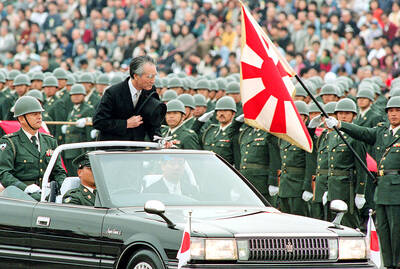A South African judge said yesterday he was considering passing judgment next month on ruling party leader Jacob Zuma’s bid to have a graft case against him dismissed.
The case could stop Zuma becoming president in an election next year that he is almost certain to win.
“I am presently minded to give judgment in about a month’s time, on the 12th of September,” judge Chris Nicholson said, adding that he would discuss this with the prosecution and the defense.
The case is the biggest obstacle to the African National Congress (ANC) leader succeeding South African President Thabo Mbeki next year.
Zuma denies the charges of corruption, fraud, money-laundering and racketeering, but says he will step down if convicted.
A long trial might mean Zuma’s case overlaps with a general election next year, which he would almost certainly win, and the combination could increase political instability in Africa’s biggest economy.
Zuma’s strong links with trade unions worry some investors, who see Mbeki’s policies as more pro-business, but they are also concerned about continuing uncertainty.
Inside the Pietermaritzburg High Court on Monday, lawyers argued the legal technicalities of dropping the charges against Zuma.
Outside, a large crowd of Zuma supporters went wild as the so-called “People’s President” appeared on a trailer and belted out an anti-apartheid song which has become his personal anthem, Bring Me My Machine Gun.
“We are here in our thousands to say ‘hands off our president, hands off,’” said Zwelinzima Vavi, a trade union leader and one of Zuma’s most outspoken loyalists.
The former apartheid-era guerrilla leader fell out with Mbeki in 2005, when Mbeki fired him as the country’s deputy president after Zuma’s financial adviser was sentenced to 15 years in jail for trying to elicit bribes from a French company.
Charges were thrown out in 2006 on a technicality. But within days of Zuma’s ANC victory in December, the National Prosecuting Authority said it had new evidence and filed racketeering, corruption, money laundering and fraud charges.
Prosecutors say Zuma accepted hundreds of thousands of dollars in bribes from Thint, formerly Thomson CSF, to use his influence to stop probes into government arms deal contracts.
But Zuma supporters say he is the victim of a political conspiracy.
“We think the charges should be dropped,” ANC spokesman Jessie Duarte told reporters. “We think it is persecution, not prosecution.”
Zuma’s lawyer argued on Monday that the case should be thrown out because prosecutors failed to consult him in 2005 after they reversed a 2003 decision not to charge him. The prosecution dismissed this as “beside the point.”
Senior ANC officials questioned the integrity of the nation’s top judges after the Constitutional Court upheld a ruling last Thursday that the 2005 police seizure of incriminating documents from Zuma’s home and office was legal.
There have also been vague warnings about changing the constitution to prevent a sitting president from facing criminal charges.
Critics say this bodes badly for the future of a country which has enjoyed a vibrant democracy and fiercely independent judiciary since the end of apartheid in 1994.

The Venezuelan government on Monday said that it would close its embassies in Norway and Australia, and open new ones in Burkina Faso and Zimbabwe in a restructuring of its foreign service, after weeks of growing tensions with the US. The closures are part of the “strategic reassignation of resources,” Venezueland President Nicolas Maduro’s government said in a statement, adding that consular services to Venezuelans in Norway and Australia would be provided by diplomatic missions, with details to be shared in the coming days. The Norwegian Ministry of Foreign Affairs said that it had received notice of the embassy closure, but no

A missing fingertip offers a clue to Mako Nishimura’s criminal past as one of Japan’s few female yakuza, but after clawing her way out of the underworld, she now spends her days helping other retired gangsters reintegrate into society. The multibillion-dollar yakuza organized crime network has long ruled over Japan’s drug rings, illicit gambling dens and sex trade. In the past few years, the empire has started to crumble as members have dwindled and laws targeting mafia are tightened. An intensifying police crackdown has shrunk yakuza forces nationwide, with their numbers dipping below 20,000 last year for the first time since records

EXTRADITION FEARS: The legislative changes come five years after a treaty was suspended in response to the territory’s crackdown on democracy advocates Exiled Hong Kong dissidents said they fear UK government plans to restart some extraditions with the territory could put them in greater danger, adding that Hong Kong authorities would use any pretext to pursue them. An amendment to UK extradition laws was passed on Tuesday. It came more than five years after the UK and several other countries suspended extradition treaties with Hong Kong in response to a government crackdown on the democracy movement and its imposition of a National Security Law. The British Home Office said that the suspension of the treaty made all extraditions with Hong Kong impossible “even if

Former Japanese prime minister Tomiichi Murayama, best known for making a statement apologizing over World War II, died yesterday aged 101, officials said. Murayama in 1995 expressed “deep remorse” over the country’s atrocities in Asia. The statement became a benchmark for Tokyo’s subsequent apologies over World War II. “Tomiichi Murayama, the father of Japanese politics, passed away today at 11:28am at a hospital in Oita City at the age of 101,” Social Democratic Party Chairwoman Mizuho Fukushima said. Party Secretary-General Hiroyuki Takano said he had been informed that the former prime minister died of old age. In the landmark statement in August 1995, Murayama said